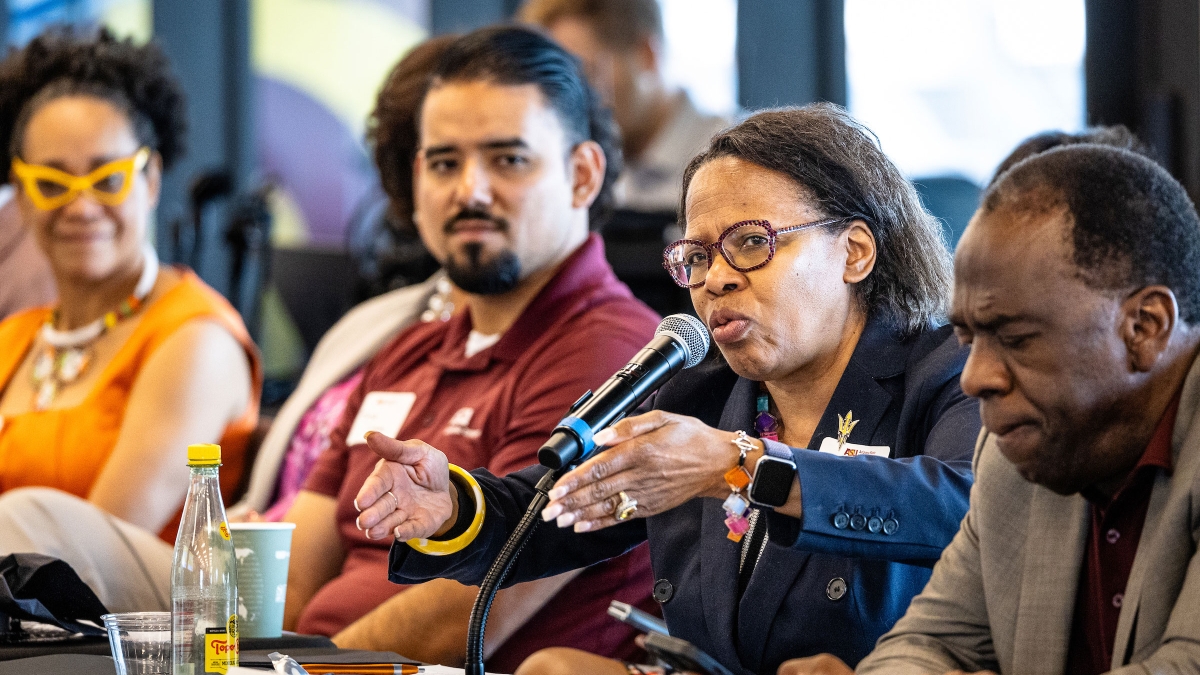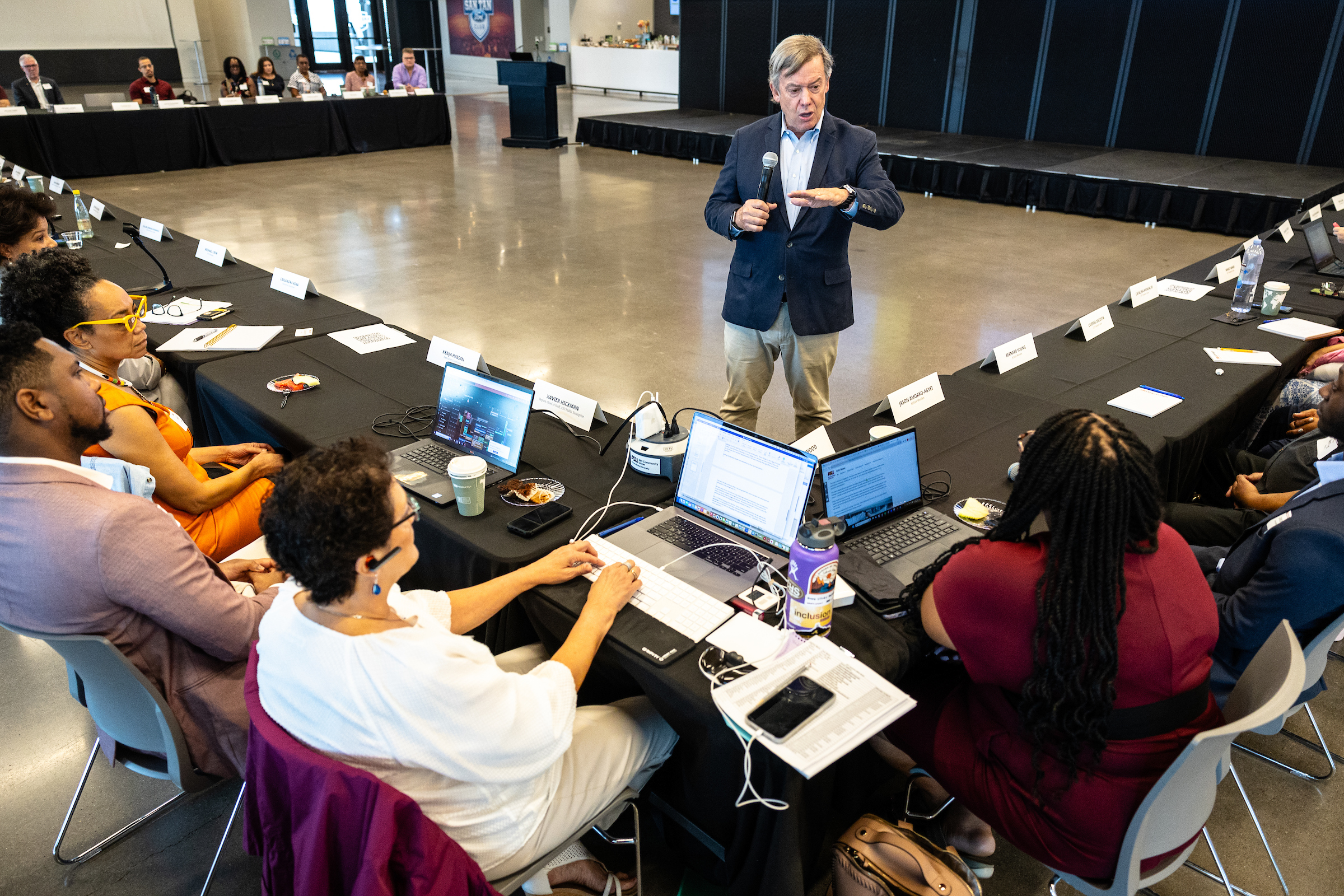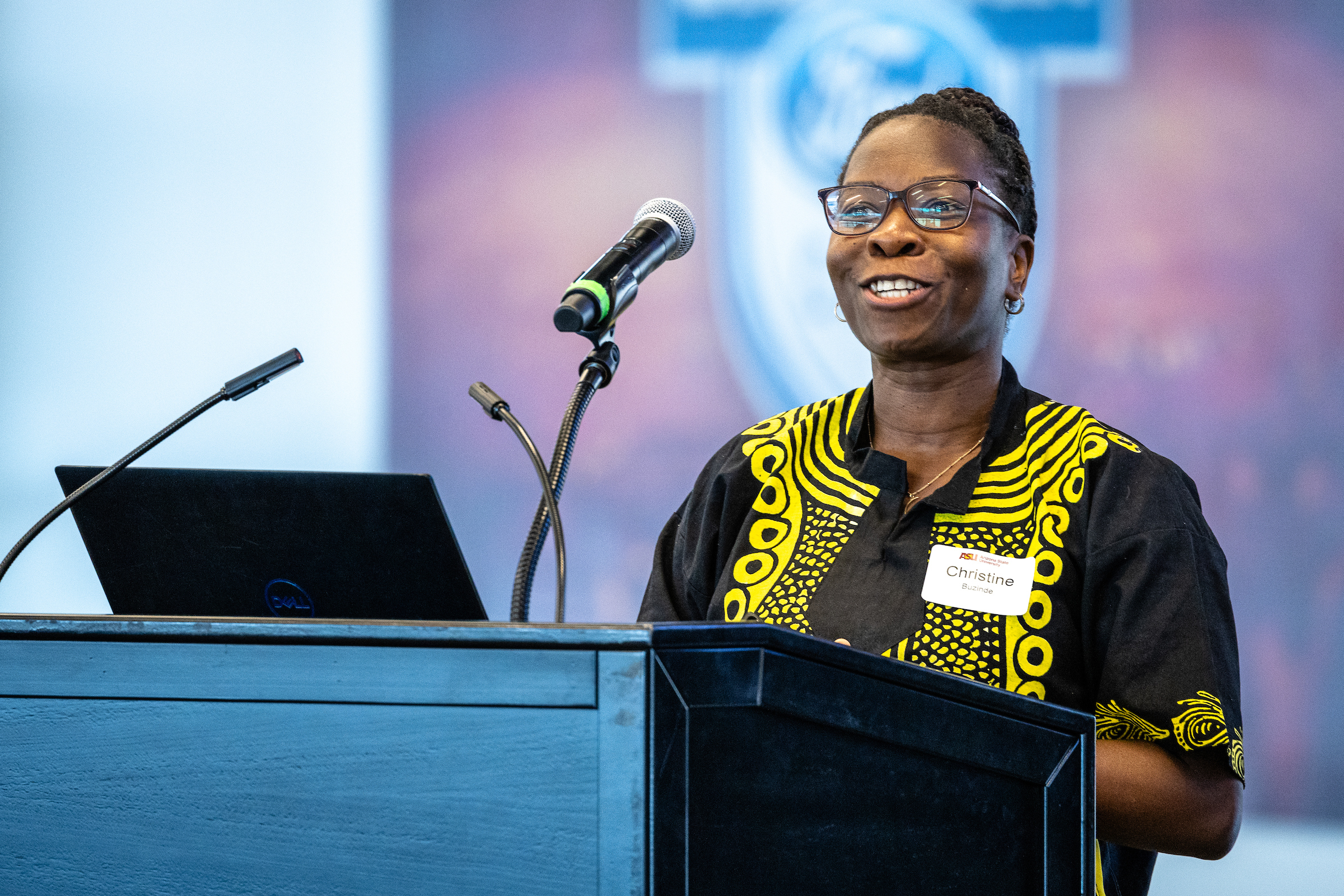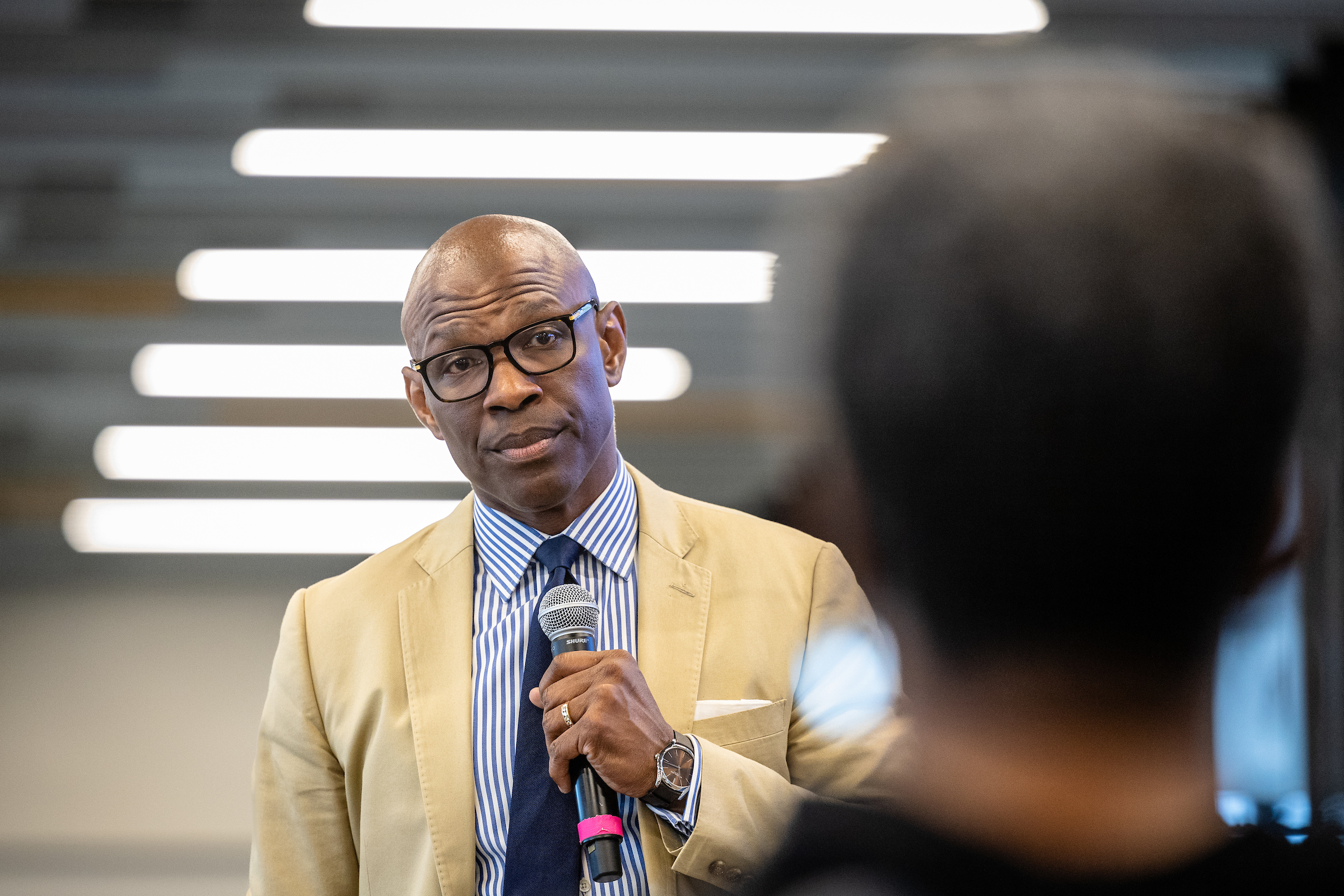Arizona State University has made enormous progress on the set of actions it adopted in 2020 to support the success of Black students, faculty and staff.
Several dozen ASU faculty and staff members gathered to hear about hiring, student engagement and data collection for the action items, called the LIFT Initiative — for Listen, Invest, Facilitate, Teach. The LIFT Initiative was created to accelerate meaningful change at the university and in the wider community.
ASU President Michael Crow addressed the LIFT Summit, held at Mountain America Stadium, telling the community that he uses the phrase “the sum of us” when discussing inclusion at the university and in the world.
“It’s about success more than fairness. It’s about moving forward rather than remedying the past,” he said.
President Michael Crow delivers the keynote speech at the ASU LIFT Summit held at Mountain America Stadium. Photo by Charlie Leight/ASU News
“We will not be successful until the entirety of our species is able to be fully engaged in laying down the foundation for where we’re going. We’re going to find a way to advance the country to higher levels of the sum of us.”
The three years of hard work on the LIFT Initiative have been quantified. Christine Buzinde, director of the School of Community Resources and Development at ASU, has been a Provost Fellow for the past year and a half, collecting metrics on LIFT Initiative results, which she presented at the summit.
“This is living proof that these initiatives are not collecting dust, but rather, this is a living document and we’re able to showcase what has been done,” she said.
The LIFT Summit covered progress ranging from the straightforward, such as creating a website and a logo for the LIFT Initiative, to the complex, such as reimagining the ASU Police Department to increase training, accountability and diversity.
Much effort has been devoted to recruiting graduate students, postdocs and retaining faculty members from underrepresented communities. For example:
• Over the past three years, 52 Presidential Graduate Assistantships have been hired and 27 Presidential Postdoctoral Fellows have been appointed, with four former fellows hired as tenure-track faculty at ASU.
• Clustered hiring of 13 faculty members has been done in four discipline areas to improve recruitment and retention.
• An ongoing data-collection project called Faculty Inclusion Research for System Transformation is tracking career life-cycle differences by race, class, ethnicity and gender. This will give a clearer understanding of which professors achieve tenure and at which point in their career, as well as what happens after that.
Christine Buzinde, director of the School of Community Resources and Development, speaks at the 2023 ASU LIFT Summit. Buzinede has been collecting metrics on LIFT Initiative results, which she presented at the summit. Photo by Charlie Leight/ASU News
Several initiatives have worked to increase engagement by Black students.
• The number of student organizations in the Black African Coalition is on track to increase from 24 last year to 35 by the end of this year.
• Sankofa, an annual welcome experience that connects students to the Black community and resources at ASU, saw an increase in the number of students who return for their next academic year. Persistence among participants went from 71% in fall 2018 to 94% in fall 2022. This year, Sankofa will become a year-round experience.
• The number of students who participated in the Black African Convocation has increased year over year.
• The RISE Leadership Institute, a college-readiness program for high school students, nearly doubled its participation rate.
• The Greater Phoenix Urban League – Young Professionals Partnerships program has seen the number of Black student mentees increase from 44 in 2020 to 200 in 2022, and the group’s members have become more engaged with students at ASU.
One of the broadest projects is the Black Student Success Initiative. ASU is working on that as part of the University Innovation Alliance, a consortium of public universities that share and scale best practices to increase graduation.
Cassandra Aska, deputy vice president and dean of students for the Tempe campus, is the co-chair of the initiative, in which ASU focused on increasing the retention rates of first-year, full-time Black students.
The work started with workshops for the participants, who included college directors, academic advising administrators and students.
“We were creating an environment where people could ask the difficult questions,” she said. “They didn’t know how to focus on targeted efforts for our Black students. They didn’t know what was allowable.”
The group worked with the academic deans of several colleges to review the data for their Black students.
“Which Black students are persisting and graduating? Why or why not? It was understanding the Black population within their community to make some informed decisions,” she said.
Kenja Hassan, assistant vice president for government and community engagement, has spent the last eight months as a fellow at the ASU Foundation, where she’s worked to build bridges between the Foundation Enterprise Partners and ASU faculty.
One of her goals was to highlight Black Philanthropy Month and support fundraising for the LIFT Initiative. More than $6,000 has been raised during the Black Philanthropy Month of August.
RELATED:
• For ASU alums Jerry and Ruth Bell, service comes above self
• ASU student on the importance of Black generosity
Participants also heard about areas for growth, including the fact that while nearly 8,000 Black students attend ASU either in person or online, there are fewer than 15 full professors who identify as Black.
Chris Howard, executive vice president and chief operating officer, noted that the admissions policies of elite universities have been in the news lately, but in reality, most students, including most Black students, go to universities that accept 75% or more of applicants, so the focus should be on student success.
Chris Howard, ASU Public Enterprise executive vice president and COO, listens to a question during the ASU LIFT Summit. Photo by Charlie Leight/ASU News
“It's not the admissions part. It’s the retention and the graduation and the persistence and then what they do afterwards,” said Howard, who is leading a working group at ASU to partner with HBCUs — Historically Black Colleges and Universities.
Crow said inclusion is critical to build an educational environment focused on the success of ASU students who comprise one of the most diverse student bodies in the nation. The university has students of all backgrounds, from all 50 states and about 150 countries around the world.
While the summit focused on recent efforts, Crow noted that he used the word “inclusion” in his first speech as president in 2002 — and it’s been central to the university’s charter for 10 years.
“It’s in granite and steel and in every document we have and on a monument on every campus,” he said.
Top photo: Colleen Jennings-Roggensack, ASU vice president for cultural affairs and co-leader of the ASU African and African American Faculty and Staff Association, speaks during the 2023 ASU LIFT Summit held at Mountain America Stadium. Photo by Charlie Leight/ASU News
More University news

ASU community exceeds goal, raises $835K for Valley of the Sun United Way
The Arizona State University community stepped up and raised over $835,266 for the Valley of the Sun United Way — exceeding the $800,000 goal for 2024.Of the total, $802,192.17 was raised through…

ASU launches online ocean futures undergraduate degrees
Our oceans make up three quarters of the planet’s surface and contain most of its biodiversity. Due to rapid and global changes, they are endangered — making more urgent a deeper knowledge of ocean…

ASU public affairs graduate programs rise to No. 11 in nation in US News & World Report’s 2025 rankings
Arizona State University rose to No. 11 nationwide for best graduate public affairs programs in U.S. News & World Report’s 2025 rankings, the magazine announced.The ranking, released April 8,…





